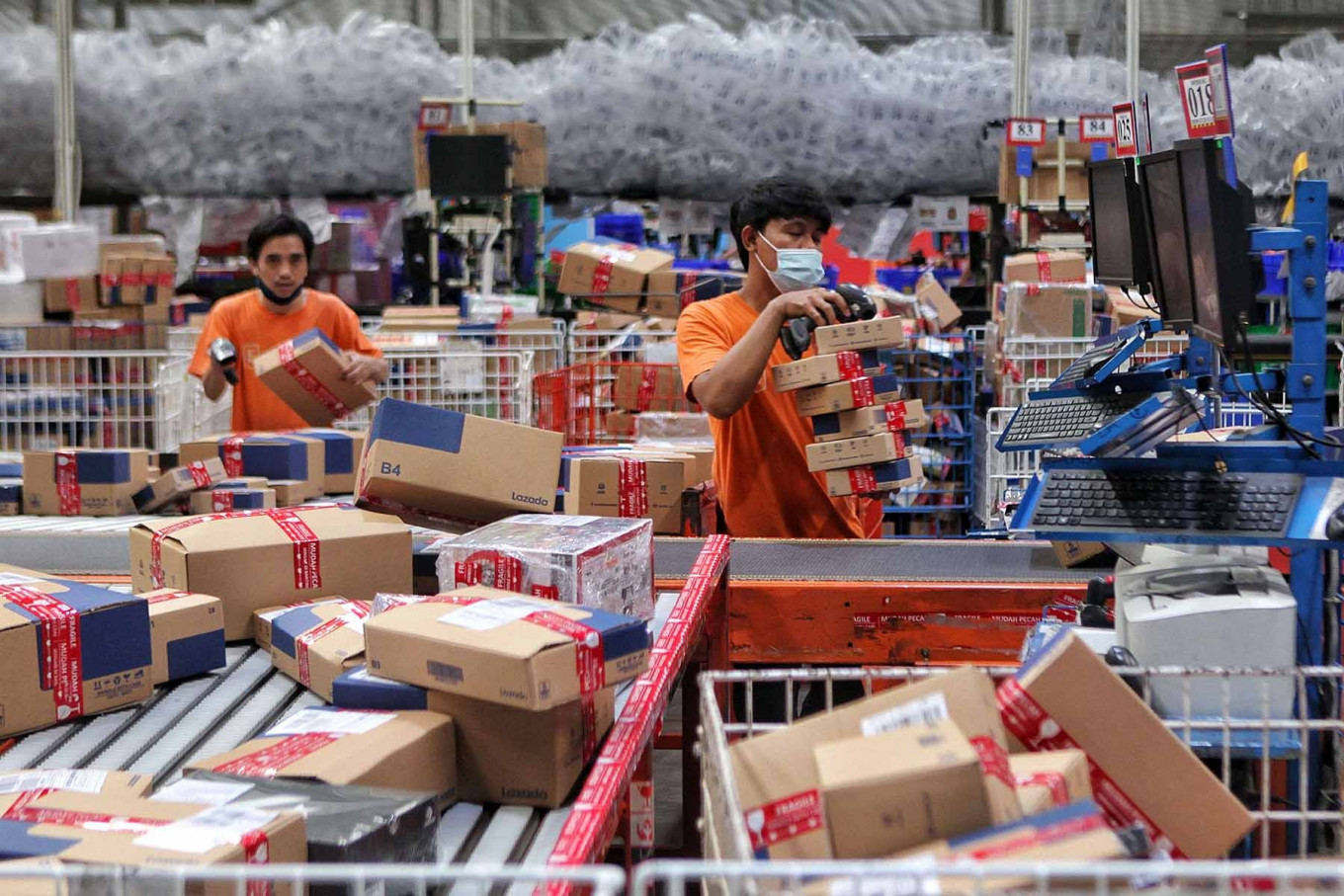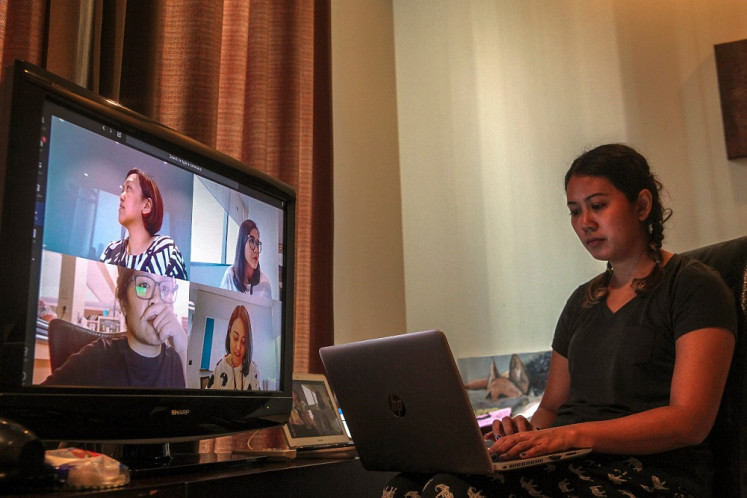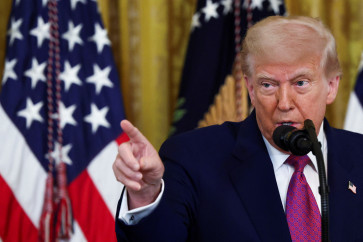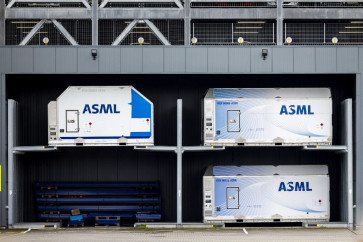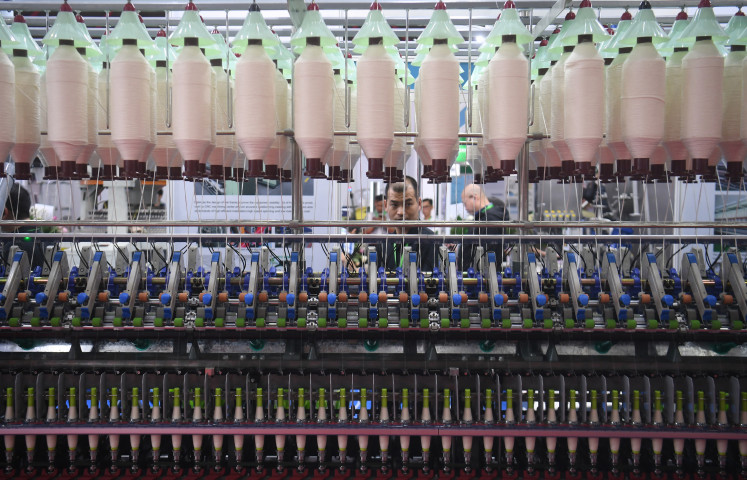Popular Reads
Top Results
Can't find what you're looking for?
View all search resultsPopular Reads
Top Results
Can't find what you're looking for?
View all search resultsE-commerce to grow moderately in 2021: Study
Online marketplaces such as Tokopedia, Bukalapak, JD.ID and Shopee have been offering extensive discounts to capture bigger market shares but that "money burning" approach is likely to slow down this year onward.
Change text size
Gift Premium Articles
to Anyone
E
-commerce in Indonesia is predicted to continue growing in 2021, albeit at a more moderate pace compared to previous years as industry players scale back on costly promotion campaigns.
A study by management consulting firm Redseer showed that the country’s e-commerce gross merchandise value (GMV) grew nearly 65 percent last year to US$37 billion, driven by an influx of new users as large-scale social restrictions (PSBB) compelled more Indonesians to shop online.
The growth rate is expected to slow to about 40 percent this year with a 30 percent compound annual growth rate (CAGR) until 2025, according to the study.
“Essentially, a moderation in growth is expected over the next few years for sure and definitely slower growth in 2021,” Redseer Southeast Asia partner Roshan Raj Behera told The Jakarta Post on March 10.
Last year, 85 million Indonesians, or around 65 percent of the population, became online shoppers. Behera said that, with the already high e-commerce user baseline, further growth would be muted.
E-commerce players would also rely more on organic user growth in the future, especially from users outside of Java, and on the current average order values rather than on aggressively attaining new consumers or artificially boosting sales values, he added.
Online marketplaces, including Tokopedia, Bukalapak, JD.ID and Shopee, have been offering extensive discounts, subsidies and cashbacks over the years to attract and capture the biggest market share, a practice often called "money burning" marketing.
“Last year, while growth was good for the sector, the burn rate was fairly under control. This year it will be disciplined.” Behera said. “So actually, subsidies and discounts will be possibly less.”
Redseer’s report also revealed that Indonesia’s e-commerce GMV did not reach the firm's projected $40 billion for 2020 due to sluggish results from shopping events held in the fourth quarter of the year such as the National Online Shopping Day (Harbolnas) on Dec.12.
Read also: Indonesia's e-commerce sales to surpass India's
Despite seeing 7 percent quarter-to-quarter (qtq) growth in October to December last year, the easing of public activity restrictions (PPKM) moved some of the expected online spending back to brick-and-mortar stores.
Purchases of electronics were also made in the second and third quarter of last year, instead of waiting for the year-end sales, as people bought laptops and tablets to accommodate working and learning from home amid the pandemic.
“That, in some sense, advances the spending that should have happened in the fourth quarter,” Behera said.
Virtual encounter: A lawyer interacts with her colleagues via video conference from her home in Jakarta on March 16. Many companies have asked their employees to work from home over concerns about the spread of COVID-19. (JP/Seto Wardhana)Indonesian E-commerce Association (IdEA) public policy and government relation head Rofi Uddarojat said transactions during 2020 Harbolnas had increased by 28 percent to Rp 11.6 trillion ($802.6 million) compared to 2019, Rp 5.4 trillion of which came from purchases of local products.
“Top purchases during last year Harbolnas were similar to the e-commerce trend before the pandemic as people started to buy fashion items, cosmetics and gadgets,” he said during an online discussion hosted by MarkPlus on March 4.
This year, he projected that people's desire to spend would increase, especially nearing Ramadan, which is to begin in April, when people usually receive holiday bonuses (THR) and splurge on electronics, fashion and gifts.
Read also: E-commerce firms bank on ‘Double Day’ shopping campaign as consumers go online
Meanwhile, economist at the Institute for the Development of Economics and Finance (Indef) Bhima Yudhistira said that there was ample room for e-commerce to grow, especially since people were still reluctant to shop offline.
“Despite vaccination programs and decreasing COVID-19 cases, people's mobility rate is still low. This means they still prefer shopping at home through e-commerce,” he told the Post on March 17.
Bhima went on to say that some e-commerce companies might continue their “money burning” promotions to increase their valuation amid talks of major e-commerce players going public.
According to the e-Conomy SEA 2020 report by Google, Singapore state investor Temasek Holdings and business consultancy Bain & Co., Indonesia’s internet economy is projected to reach $124 billion in 2025, making up a large portion of the projected $309 billion total internet economy potential in Southeast Asia in 2025.

